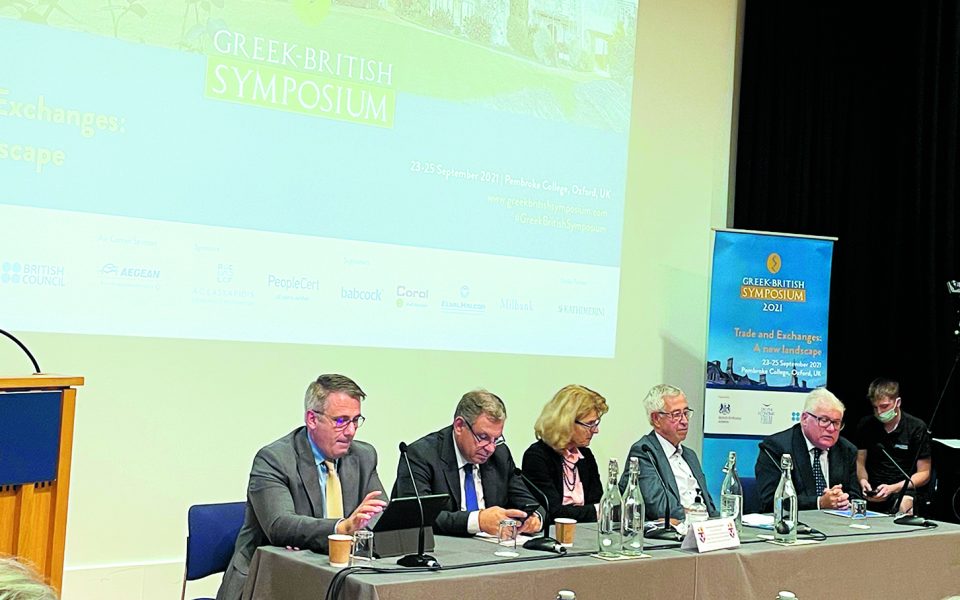Greece and Britain in a new landscape

In today’s fluid international environment, will Greece and Britain be able to build on the foundations of a long relationship, on close ties dating from the early 19th century, when Greek merchants, bankers and shipowners established themselves in London, Manchester and Liverpool? Those Greeks, the first to gain the right as Ottoman subjects to settle in Britain, created successful businesses, exploiting the financial opportunities presented by London and the markets of the British Empire. What contributed to that successful coexistence? Can it be repeated today by two very different countries in very different circumstances – one a member of the European Union, the other having chosen a path outside it? Which are the particular opportunities and difficulties that each faces today?
These were a few of the questions that were examined in depth by eminent historians, economists, researchers, academics and other participants at the Greek-British Symposium, which took place at Pembroke College in Oxford on September 23-25. With the theme “Trade and Exchanges: A New Landscape,” this was the fifth of the annual events which are held alternately in Britain and Greece.
The United Kingdom has played a key role in the history of Greece. The bicentennial of the start of the War of Independence provides a good opportunity to examine the past and to seek opportunities in the future. A Great Power at the time that the Greeks were fighting for their freedom, Britain, with the world’s mightiest navy, played a decisive role in the victory of the Greeks and the establishment of the Greek state. Greeks in Britain contributed greatly to the struggle and took part in preparing a loan for the Greeks, a development which, aside from the financial aspect, amounted to de facto recognition of a state that did not yet exist. The ideas of liberal British intellectuals inspired the revolutionary Greeks. And the Greeks’ struggle for freedom inspired their British supporters, who also played a decisive role in its successful outcome.
Today, relations between the two nations remain very close at many levels, because of their long history together, because of the many thousands of Greeks who have studied in Britain and those who have lived there for many years or moved there during the Greek crisis. Furthermore, many Britons live in Greece.
Turning to the present, the Symposium focused on how difficulties and disruptions in international relations and the global economy might provide opportunities for closer ties in trade, finance and the exchange of services. Indeed, current problems make it even more necessary to look for potential gains in Greek-British relations.
As was noted, the climate crisis and the need for national economies to adapt to renewable energy sources area is disrupting economies and raising costs in production and transportation. But there are also opportunities to develop ideas and technologies to deal with this. All countries are obliged to adapt as quickly as possible to this challenge and to the ever greater dominance of the digital economy.
As one speaker commented, Greece can exploit the opportunity provided by the technical revolution without carrying the burden of non-competitive industries. However, the success of the effort depends on ever greater numbers of people having access to very fast internet services – a sector in which Greece lags, both in terms of speed and price.
It was stressed that talented immigrants also play a vital role. As one speaker noted, they not only bring new skills, but they also push the locals out of their comfort zone, forcing them to develop their own abilities further. This can be seen not only in London but also in Stockholm, Silicon Valley and Germany, he added.
Panels at the Symposium examined problems and opportunities in the international trading system, where services are becoming an ever greater part of trade, China is playing a larger role and the pandemic has shown up difficulties in global supply chains. The increasingly complicated networks of production and distribution, the greater mass of transported goods and the need for security all affect trade and transportation. This means that new opportunities arise continually, as do problems that demand solutions.
In this context, many speakers noted, Greece and Britain ought to strengthen already excellent relations even further, especially in culture, education and technology.
Apart from the effects of Brexit, both countries are dealing with a world in which trade is no longer so much in goods as in services, ideas and highly skilled people. Both countries have dynamic tourism and professional services and research and cultural sectors that could cooperate further.
The Greek-British Symposium is supported by the British Embassy in Athens, the Delphi Economic Forum and the British Council. Kathimerini has been its media partner from the start. Meetings are held under the Chatham House Rule, which means that what is discussed is not attributed to specific speakers.
This year, speakers and participants included historians Anthony Howe, Peter Frankopan, Katerina Galani and Andreas Kakridis; economists Rebecca Harding, Vicky Pryce, Douglas McWilliams, David Bailey and Nikos Vettas; business adviser Rod Dowler; professor of e-business George Doukidis; director and chairman of the board of the Demokritos Center for Scientific Research George Nounesis; Lord Willetts, president of the Resolution Foundation; Lord Mandelson, co-founder and chairman of Global Counsel; Marco Veremis, co-founder and executive board chairman of Upstream; Andreas Athanassopoulos, deputy CEO of Eurobank; Apostolos Gkoutzinis, partner at Milbank’s Global Capital Markets Group; the two countries’ ambassadors, Matthew Lodge and Ioannis Raptakis; Denis MacShane, former UK minister of state for Europe; Alberto Costa MP, chairman of the All-Party Parliamentary Group for Greece; Stathis Kalyvas, Gladstone Professor of Government, Oxford University; Anand Menon, professor of European politics and foreign affairs at King’s College London; and Will Hutton, president of the Academy of Social Sciences. His Eminence the Archbishop of Thyateira and Great Britain Nikitas delivered the keynote speech at the formal dinner. Britain’s Secretary of State for Business, Energy and Industrial Strategy Kwasi Kwarteng joined the opening of the Symposium via video. Greece’s Minister of Development and Investments Adonis Georgiadis took part in the opening plenary. The Symposium is chaired by Costas Mitropoulos (Greece) and Lord Maude of Horsham (Britain).
A timely discussion
One of the panels, on “Greece and Britain’s Trading Relationship: More and Better,” looked at how supply chain problems were affecting the British market that very day, with gasoline shortages and fears for supplies of goods at Christmas. This underlined the problems stemming from Brexit – from the shortage of workers in crucial sectors of the economy to the general framework for trade with the European Union.
Every discussion in Britain is held under the shadow of Brexit. One of the speakers revealed that he spent 45 minutes looking for diesel for his car in order to get to Oxford. “Progressively, we are going to have to put our commercial and economic interests over politics,” he said, noting that the referendum had been held in 2016. “It is now 2021 and I can’t find diesel for my car.”
As the panel noted, relations between Greece and Britain are determined by the relationship between Britain and the EU. There is, however, room for further strengthening bilateral ties and a need to do so.
The EU-UK Trade and Cooperation Agreement causes bureaucracy, delays and uncertainty.
“Brexit was not about economics, it was about ‘sovereignty,’” a British panelist said. “There is no economic plan with this. It will take a significant amount of time to work out.”
The framework remains unclear in crucial areas. Among them, the legal framework for contracts, new rules that will apply to trade, the status of foreign students and foreign-born university staff. Greeks on the panel, however, noted that the capital for big investments was to be found in London and that British contract law remained the law of choice.
“If the investment is good and there is a good return, people will find ways around the institutional framework,” one speaker noted.
Aside from agricultural products, Greece exports technology and pharmaceutical products to Britain. There is great room for improving trade in goods, for cooperation in research and technology, for investments in Greece in infrastructure, health care, real estate, logistics, tourism etc. However, as one speaker said, Brexit has damaged the image of Britain and there are opportunities for students, professors and businesses opening up in EU countries and the United States.
One of the British speakers referred to the “magnetism” of a country. “How are we going to present and project ourselves to the rest of the world, to encourage people to come visit and do business with us?” he asked. “This is a very important challenge and, in my opinion, one that we can get right.”
He was referring to Britain but the challenge is common to both countries.





